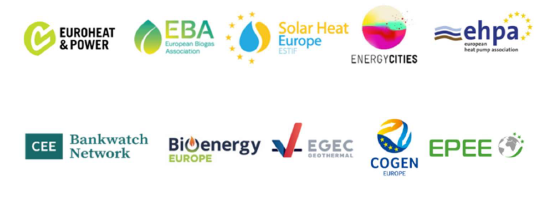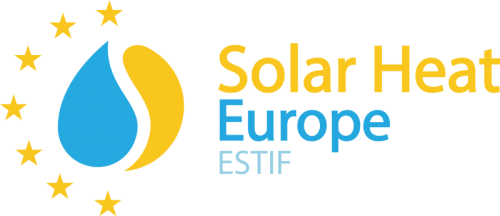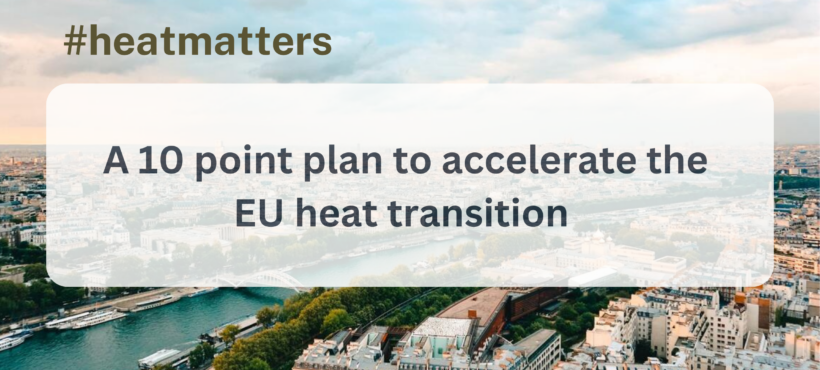Brussels, 18th October 2022 – Ten organisations have today released a 10-point plan for a successful heating and cooling transition to tackle the current energy crisis. Among key actions, signatories call for the revision of the EU’s outdated heating and cooling strategy, the implementation of mandatory heat planning and a ban on using individual, fossil-only boilers in buildings.
The current energy crisis is a heating crisis. Half of the European energy consumption goes to heating and cooling, and 42% of this demand is supplied by natural gas. Buildings are the largest consumers of natural gas, most of which is used for space and water heating.
Six months after the publication of the REPowerEU plan, signatories deplore the EU’s lack of focus on deploying renewable and clean heating and cooling technologies which can significantly contribute to reducing the use of natural gas in buildings and put Europe on the path to climate neutrality and energy independence.
The 10-point plan covers a range of measures, some of which may be integrated into the next batch of EU emergency measures. These include implementing mandatory heat planning for all cities or the EU-wide phase-out of individual boilers that use only fossil fuels.
The 10-point plan also underlines the necessity of upgrading the EU’s outdated heating and cooling strategy with concrete regulatory and financial instruments which will support the deployment of renewable heat solutions. These include solar heat and sustainable waste heat, as well as the roll-out of efficient heating technologies – for example, residential and large-scale heat pumps connected with district heating networks.
The latest European heating and cooling strategy was published in 2016, even before the EU committed to achieving climate neutrality before 2050 and is no longer fit for purpose.
Pedro Dias, Secretary General, Solar Heat Europe:
”Heat is half of the EU energy consumption and the main use of Russian gas. Therefore, policymakers must focus on the fast deployment of existing renewable heat technologies to solve the problems of energy security and affordability while contributing to decarbonisation. Solar heat offers a quick-to-deploy EU-made renewable solution that is non-dependent on critical minerals and creates jobs based in Europe’’.
Aurélie Beauvais, Managing Director of Euroheat & Power, commented:
“Efficient District Heating and Cooling is a proven solution to phase-out fossil fuel in buildings and shield consumers from soaring energy prices. Six months after the launch of the REPower EU, we must upgrade our emergency toolbox with concrete measures which accelerate the roll-out of clean heating technologies in buildings. Mandatory heat planning, in particular, should be urgently introduced.”
Stephan Brandligt, Vice President of Energy Cities, Former Deputy Mayor of Delft (The Netherlands):
“This energy crisis must be a wake-up call for an urgent and thorough transition to make our current heating and cooling systems renewable and resilient. As experimented in the Netherlands, the local approach is the key to such a transition, provided local governments are supported with adequate human, financial and technical resources”.
Thomas Nowak, Secretary General, European Heat Pump Association:
“Turning on the heating shouldn’t be a nightmare for people’s wallets or for the planet. EU governments need to help all of us move towards renewable energy-based heating for good. They must support people and businesses as they renovate buildings and invest in heat pumps, and ensure the supply chain, staff, and local strategies are up to scratch. This will help everyone have access to clean, affordable heating.”
Hans Korteweg, Managing Director, COGEN Europe:
“Decarbonisation of heating is essential for achieving the EU’s energy and climate ambitions. This will require measures to prevent heat loss, boost the uptake of renewables and prioritise the efficient production of both heat and power via cogeneration. Wasting valuable energy must not be an option anymore!”
Jean-Marc Jossart, Secretary General, Bioenergy Europe:
“We want to deliver on the Fit-for-55 package’s objectives, and it is essential to act now and put the H&C sector at the centre of EU political debate. To reach climate neutrality by 2050, concrete actions must be implemented, such as retrofitting old heating installations with modern renewable ones. This can significantly increase energy efficiency, reduce emissions and address air pollution. With the current crisis, we need affordable, local and renewable heat sources such as bioenergy and a comprehensive approach in our decarbonisation strategies.”

About Solar Heat Europe/ESTIF
Solar Heat Europe/ESTIF’s mission is to achieve the prioritisation and acceptance of solar heat as a key element for sustainable heating and cooling in Europe and to work for the implementation of all necessary steps to realise the high potential of solar heat. With members in more than 15 European countries, Solar Heat Europe represents directly or indirectly over 90% of the industry, across the value chain. Solar Heat Europe published in June 2022 a solar thermal roadmap: Energising Europe with Solar Heat.
About Solar Heating and Cooling
Solar thermal offers key advantages that makes it essential to the solution of this crisis:
- It directly converts solar energy into thermal energy, so it is decoupled from electricity prices.
- It is 100% renewable energy, not being dependent on the carbon content of the electricity supply, so it does not jeopardize the European decarbonization strategy.
- It is a long-established and competitive solution, with a strong European industrial base that supplies the large majority of the European market and is a net exporting sector.
- It does not require critical minerals and most of the components are widely available via several supply channels; while trying to contain the damages of a dangerous strategic dependency on Russia, it is crucial that Europe does not establish other strategic dependencies, notably with China.
Contact:
| Pedro Dias
Secretary General Tel: +32 2 318 40 55 |
Alexandra Sutu
Communications and Events Officer alexandra.sutu@solarheateurope.eu Tel: +32 474 94 09 81 |


Leave a Reply